- Home
- Douglas E. Richards
MindWar (Nick Hall Book 3) Page 2
MindWar (Nick Hall Book 3) Read online
Page 2
Lucas took this all in but didn’t respond.
“I also have a reputation for caution. For tying up as many loose ends as I possibly can. This is reassuring to the people I deal with.”
“I understand,” said Lucas. “Which is why letting these men go free would be a mistake.”
“Exactly. But even if none of this were true, in this case I’m doing society a favor. I’ve chosen hardened criminals who deserve to die. The man in front of you has raped and beaten any number of women. If he is released, there is no doubt he would pick up where he left off.”
Lucas nodded in sudden understanding. He knew his father’s history and that nothing stoked his rage more than a man who would beat a helpless woman. There was a reason he had saved this particular prisoner for his son’s first kill, and why he was rubbing salt in the man’s wound by letting him listen in as his fate was discussed, marinating in the inevitability of approaching death.
Lucas’s father, a man now known only as Victor, had been born Juan Jose Perez in a tiny hovel in Puerto Vallarta, Mexico. Juan Jose’s beautiful mother had been forced to turn to prostitution to support him and his three siblings when their abusive father had abandoned them, and she was beaten several times when he was very young, and finally killed by a particularly brutal American.
Juan Jose had already hated Americans for their smug attitude of superiority, for how poorly they treated the natives of Puerto Vallarta, but the nature of his mother’s death intensified this hatred and burned it deep into his psyche.
The day his mother died was the day Juan Jose left Puerto Vallarta forever, at the age of twelve, and joined a drug cartel. In addition to his home, he left his name behind as well. From that day forward he was simply Victor, a name that meant conqueror, something he vowed to be.
True to his vow, he was able to marshal his genius and determination to rise through the ranks of the cartel in record time, leading him to become one of the most powerful drug lords in the world, worth hundreds of millions of dollars before he was thirty.
And then he had reinvented himself, turning his back on the drug business and becoming an arms dealer instead. And as technology became more and more critical to militaries, far outpacing guns and missiles, he had morphed once again, not only acquiring or stealing technology, but assembling a team of world-class scientists of his own to modify or improve it to better suit his customers’ needs.
But no matter how wealthy and powerful he had become, the memory of his beloved mother would never be far from his thoughts. Which meant that the brutal rapist sitting before him had earned a special place in hell.
“I understand,” said Lucas simply. “This man has it coming to him. But even if not, we should err on the side of caution, and eliminate our subjects as possible loose ends.” He frowned. “I guess I hadn’t really thought this through.”
“No reason to expect that you would. You haven’t been exposed to this side of the business. But it’s time that changed. When killing is necessary, often for your own survival, you can’t afford to be fearful, to be squeamish, to spend even an instant wrestling with ethical issues. Which answers why I won’t be experimenting on this man any further. Because I want him to have all of his faculties when you kill him.”
He paused to study his son’s reaction to this and then continued. “You see, killing a lucid man pleading with his eyes for mercy is much more difficult than killing a vegetable. And I want you blooded. A soldier who has never taken a life is unreliable and a possible liability on the battlefield. But killing is like anything else—the more you do it, the easier it becomes. So my job is to see to it that you’ve made peace with any demons you have about taking a life. To see to it that you’ve killed with your own hands so many times that you become jaded, calloused. This will be important, because there will come a time when your life will depend on doing so without an instant of hesitation.”
Lucas displayed a kaleidoscope of emotions as his father’s words slammed into him like a battering ram—disgust, resolve, even dread—but only for a moment. His demeanor became stoic again with surprising speed and a thoughtful expression replaced all of the others. “Which also explains why a lethal injection is out.”
Victor nodded. “Not that your suggestion doesn’t have merit. In fact, this is exactly how these two other subjects were put down. But as you’ve concluded, I want you to be more hands-on. I’ll make sure you’re called in to kill all of our subjects who remain lucid when we decide to stop experimentation on them. A gunshot will suffice for this animal,” he said, gesturing to the prisoner in contempt, “since he is your first kill. But after this I will ask you to stab several subjects to death, something that is much messier and demands a higher level of callousness and . . . commitment. Finally, when you’re able to do this without vomiting, without even blinking, I want you to torture some of the prisoners before you end their lives.”
Victor noticed that his son looked ready to vomit already. But this would change. He would go from soft to brutally efficient in no time at all.
Victor’s own features softened and he lowered his voice. “You should know, Lucas, that I abhor violence. Truly. I take no joy in hurting others, and neither should you. If this were hunting, we should both be men who only do so when we are starving, never just for sport. I want you to be comfortable killing, but only when required. I am not a monster, and I don’t intend for you to be.”
“I understand.”
“These men need to die anyway,” said Victor. “And they deserve to. So why not let their deaths serve a broader purpose?”
“To get me acclimated to killing?”
“Exactly. To further your education. And on this subject, I should tell you that I couldn’t be any prouder of your accomplishments so far. The work you did to earn your PhD in robotics is truly brilliant.” Victor paused and added, “Dr. Perez,” emphasizing the word doctor with obvious pleasure.
“Thank you, Father. But no more Dr. Perez for me. I intend to become known only as Lucas. Like you, I intend to build my reputation around one simple name.”
Victor raised his eyebrows. This pronouncement had been unexpected. “If this is what you want, you have my full support.”
“Thank you,” said Lucas. He paused for several long seconds. “So how many men—subjects—do you think it will take before you achieve your goal?”
“Impossible to tell,” replied his father with a shrug. “I’d guess at least fifty. Probably hundreds. Possibly even thousands.”
“And do you intend to continue paying wardens to deliver fourteen at a time?”
“No. I’ve been busy, but I know I have to come up with a better source.”
“I have an idea on that,” said Lucas.
“Really?” said Victor, instantly intrigued. “Tell me.”
“I suspect you’re aware that ISIS continues to engage in ethnic cleansing whenever it engulfs new territory.”
Victor nodded. “Which is one reason I’ve cut off ties with them recently, and all other Jihadi groups as well. My relationships with these groups have proven lucrative, but their insane zeal to slit the throats of anyone who doesn’t subscribe to their version of Islam finally became too repugnant even for me. Since you and I are not radical Muslims, they would happily saw off our heads the moment we ceased to be useful to them.”
“Perhaps it makes sense to reestablish these relationships,” suggested Lucas, “if only temporarily. I linked to the latest report from Amnesty International on the state of ISIS’s ethnic cleansing on the way here. You know, using my phone,” he added pointedly.
Victor’s eyes danced in amusement. His son wanted BrainWeb implants like his so he could surf the Web with his thoughts, and was annoyed that Victor hadn’t yet offered them up. “What a terrible burden that must have been for you, Lucas,” he said wryly, a grin spreading across his face.
His son couldn’t help but return the smile, realizing that this hadn’t been the most compelling of complaints. �
��Well, just so long as you can feel my pain,” he replied sheepishly.
“But getting back to what you were saying . . .” said Victor, prodding his son to continue.
“According to the report, when ISIS overruns a village or city, they don’t just shoot the civilian populations at random. They gather them up first in an orderly manner. They have become far more systematic, emulating the Nazi extermination programs more and more.”
Victor caught on immediately. “So you’re suggesting that I establish a small facility close to where ISIS is operating. That I buy experimental subjects from them in bulk, so to speak.”
“Exactly. You still have relationships with their leaders, and their trust. So buy a thousand guinea pigs at a time instead of fourteen. This is much faster and more efficient, not to mention reducing the number of possible loose ends.”
Victor considered his son carefully, astonished by the utter cold-bloodedness of the idea. Perhaps Lucas wasn’t as soft as he had thought. “It wouldn’t bother you that we’d then be killing helpless innocents rather than hardened criminals?”
“Yes, it would bother me. But these people are marked for death anyway. Our intervention actually buys them several additional days of life they wouldn’t otherwise get.”
“But once we do have them in our control, they are no longer in danger of death. We really would have it in our power to let them go, to allow them to live to a ripe old age. So as much as it would be nice to tell ourselves otherwise, we really would be murdering innocents.”
“I think you’re overthinking this, Father. The bottom line is that if you don’t employ this strategy, these people will all surely die. If you do, they’ll get a brief reprieve—and maybe a full pardon. Because once you’re able to discover the secret to mind reading, I would argue that you could let whoever remained live, since at that point you would be all but invincible.”
Victor wasn’t sure if he was proud of his son’s ruthlessly efficient logic and the audacity of his proposal, or alarmed at his ability to so quickly find justification for the slaughter of innocents. Apparently, Lucas was already able to see ethical decisions as nothing more than simple mathematics. These people were scheduled to die, so if Victor saved them from this, but later murdered them himself, he was simply balancing out the equation.
“Interesting proposal,” he said finally. “Let me think about this and we can discuss it again at another time.”
Victor turned to face his experimental subject and his son followed suit. “But for now, it’s time to rid the world of Hector Alonzo. Go ahead. One clean shot in the throat.”
“Why not between the eyes? Is this because taking out his jugular is a more grisly death? Something more difficult for me to do?”
Victor smiled. “Partly. Mostly it’s because he has priceless technology imbedded in his brain. Which I’d like to re-use.”
“Of course,” said Lucas, looking annoyed that he hadn’t realized this on his own.
“But if you’d prefer, shoot him in the heart. Your call.”
The prisoner was shaking his head in horror as tears began to fall from his bulging, pleading eyes. Lucas stared into his eyes, took a deep breath, and without saying another word dug the gun into the man’s throat and pulled the trigger. The entry hole was relatively small, but the bullet expanded immediately as it traveled and took out much of the back of his neck, accompanied by an explosion of blood from his jugular.
As Lucas lowered the gun, Victor noted that his son’s hand was shaking and gorge appeared to have risen in his throat. He watched as the young man fought to get control of himself, refusing to look away from the gory, nearly decapitated man he had shot, as the last of his victim’s life continued to geyser out onto the cement below.
But somehow, before Victor’s eyes, Lucas’s trembling hand, nauseated expression, and pale coloring all disappeared as quickly as they had arrived.
Victor put a comforting hand on his son’s back. “I know that wasn’t easy,” he said softly. “But it was necessary.”
Lucas stood in silence for several more seconds before finally turning away from his gruesome victim. “Whatever it takes,” he said evenly.
3
Victor sat on a bench on the waterfront promenade near the Golden Bauhinia Square in Wan Chai and allowed himself to become lost in Hong Kong’s Symphony of Lights. For once he turned off his prodigious mind and let himself be washed away by the beauty and spectacle of the show.
Immense columns of pinks, blues, and greens shimmered across the harbor waters, many times the size of the skyscrapers that had generated them, painting a vibrant city-sized landscape that seemed to pulse with life against the pitch-black sky, and which—literally and figuratively—reflected the vibrancy of the city itself.
The night was cool and crisp and clear, something that wasn’t always the case in this thriving, electric metropolis of just over seven million—especially the clear part. But Hong Kong truly was a spectacular destination, greatly outpacing second place London as the world’s most visited city. Victor had been here a handful of times, but had never before had occasion to let himself become immersed in the largest and most impressive permanent multimedia light and sound show on Earth.
Although China had assumed control of this tiny territory off its southern coast after a hundred and fifty-six years of British rule, the Chinese government had largely honored its commitment to leave Hong Kong’s economy alone, one of the most prosperous in the world.
“As you requested,” said a pleasing feminine voice in his head, tied directly to his auditory cortex, “I’m informing you that the show will reach the fourteen-minute mark . . . now.”
Thanks, he thought unnecessarily to the Personal Digital Assistant function of his BrainWeb implants, which he had named Maria. The fireworks would commence at any moment. He turned away from lasers and pulsating lights that were dancing to a glorious musical symphony to watch the people around him.
Just as the pounding pyrotechnics began, a tall Chinese man separated from the crowd, made his way closer to Victor, and sat on the bench beside him. “I hope you are enjoying the show,” he said in accented English, “modest though it is,” he added.
Victor was fluent in English, and with a quick thought disabled the translation function of his implants. “Immensely,” he replied, knowing that no one in any other culture would possibly call what he had just seen modest.
“Please excuse my ignorance of the Spanish language,” said the man as fireworks continued to boom and dazzle above them, “and my poor use of English.”
“There is nothing to excuse,” said Victor, “your English is more than good enough, my friend,” he added, knowing that the man’s English was perfect, and annoyed at needing to play this game. He preferred to deal with people raised in cultures in which communication was direct, even blunt, like in Russia or Israel. He had little patience for the endless false humility and self-effacement that was so critical to the Chinese culture.
“I would be honored if you would walk with me,” said the man as the grand finale began. Many dozens of fireworks streaked into the sky in rapid-fire succession and exploded into dazzling jets of color, filling the senses with sound and fury and turning the night into day.
“The honor is all mine,” replied Victor.
They walked in silence for ten minutes, ants among the never-ending array of skyscrapers and neon, until they entered the lobby of a fifteen-story glass structure overlooking the harbor that proclaimed itself to be the Intercontinental Hotel. They rode the elevator in silence to the top floor, where the man he had come to see had rented an opulent suite.
There, amidst humble apologies, Victor was picked over for nearly ten minutes by two men using their fingers and an array of wands and sophisticated electronic sensors, ensuring he was unarmed and that no video or listening device could possibly be on his person, or even wedged in the most private of places.
Finally, with this process complete, he was left al
one with the man who he had come to see, General Li Jeng, a Chinese man of short stature and typical straight black hair who exuded an unmistakable sense of vigor and command and maintained a shrewd glint in his steely brown eyes. The general’s family name, Li—which unlike Western culture came before his given name—was the most popular in China.
After a few minutes of introductions and self-effacing small talk in English, a language that the general wielded better than most native speakers, Victor was motioned to a chair beside a long table laid out with cups of tea and an assortment of fruit and pastries. As Victor took his seat, Li Jeng apologized for the inadequacy of the offerings and especially for the inconvenience of the lengthy full body cavity search to which his guest had been subjected.
“Not at all,” said Victor, politely accepting an elegant bone china cup decorated with delicate blue pagodas, and taking a sip of the tea inside. “In fact, General Li, I’m very glad you took this precaution. I want you to have absolute confidence that what is said here will never leave this room.”
“I appreciate that,” replied the general, taking his own cup of tea and setting it on the table next to his chair as Victor had done. “It’s an honor to finally meet you. I am well aware of your previous dealings with my colleagues, who have praised you as being brilliant and honorable, and the technology you provide indispensable.”
“You flatter me, General,” said Victor, the rote response required of him. “And of course, I am here today only because of your reputation for being an up-and-coming force to be reckoned with. A current and future star in the Chinese government.”
“I fear that this is not the case,” said the general modestly. “I am but a simple man, honored that my meager abilities have been of some small service to my country.”
Victor fought not to roll his eyes. “General Li, before we begin, I have a favor to ask. I know you have experience dealing with Americans, Russians, and others raised in similar cultures. I mean no disrespect, but I would be grateful if we could perhaps conduct our business in a slightly more direct fashion than is typical in China.”

 Oracle
Oracle![[2016] Infinity Born Read online](http://i1.bookreadfree.com/i/03/18/2016_infinity_born_preview.jpg) [2016] Infinity Born
[2016] Infinity Born Infinity Born
Infinity Born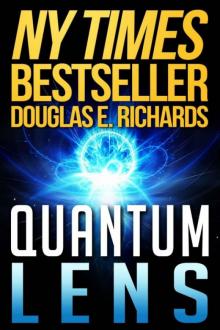 Quantum Lens
Quantum Lens The Cure
The Cure The Immortality Code
The Immortality Code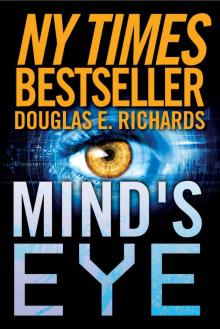 Mind's Eye
Mind's Eye MindWar (Nick Hall Book 3)
MindWar (Nick Hall Book 3)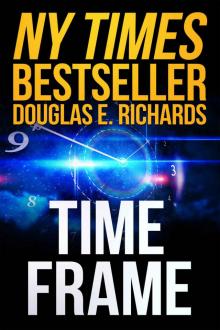 Time Frame (Split Second Book 2)
Time Frame (Split Second Book 2)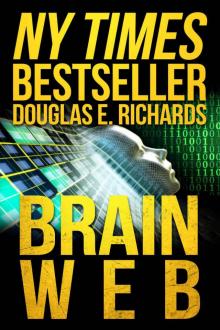 BrainWeb
BrainWeb Wired
Wired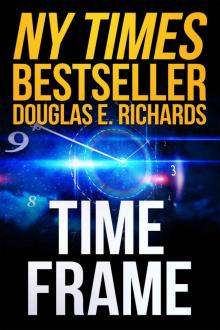 Time Frame
Time Frame AMPED
AMPED Out of This World
Out of This World AMPED w-2
AMPED w-2